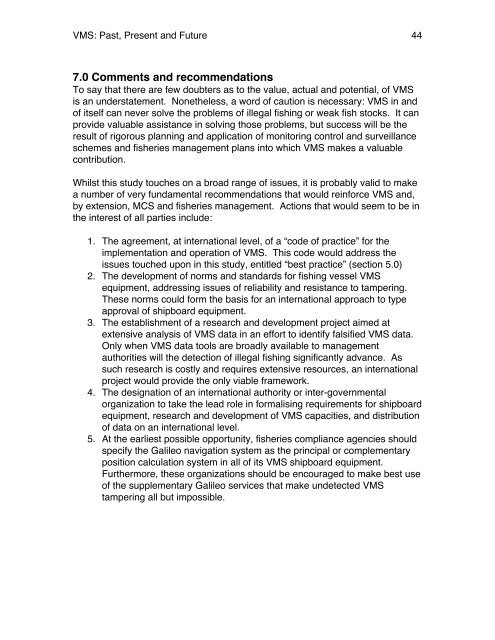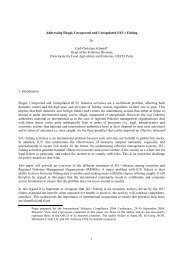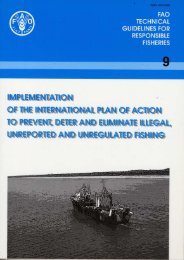Fishing Vessel Monitoring Systems: Past, Present and Future
Fishing Vessel Monitoring Systems: Past, Present and Future
Fishing Vessel Monitoring Systems: Past, Present and Future
Create successful ePaper yourself
Turn your PDF publications into a flip-book with our unique Google optimized e-Paper software.
VMS: <strong>Past</strong>, <strong>Present</strong> <strong>and</strong> <strong>Future</strong> 44<br />
7.0 Comments <strong>and</strong> recommendations<br />
To say that there are few doubters as to the value, actual <strong>and</strong> potential, of VMS<br />
is an understatement. Nonetheless, a word of caution is necessary: VMS in <strong>and</strong><br />
of itself can never solve the problems of illegal fishing or weak fish stocks. It can<br />
provide valuable assistance in solving those problems, but success will be the<br />
result of rigorous planning <strong>and</strong> application of monitoring control <strong>and</strong> surveillance<br />
schemes <strong>and</strong> fisheries management plans into which VMS makes a valuable<br />
contribution.<br />
Whilst this study touches on a broad range of issues, it is probably valid to make<br />
a number of very fundamental recommendations that would reinforce VMS <strong>and</strong>,<br />
by extension, MCS <strong>and</strong> fisheries management. Actions that would seem to be in<br />
the interest of all parties include:<br />
1. The agreement, at international level, of a “code of practice” for the<br />
implementation <strong>and</strong> operation of VMS. This code would address the<br />
issues touched upon in this study, entitled “best practice” (section 5.0)<br />
2. The development of norms <strong>and</strong> st<strong>and</strong>ards for fishing vessel VMS<br />
equipment, addressing issues of reliability <strong>and</strong> resistance to tampering.<br />
These norms could form the basis for an international approach to type<br />
approval of shipboard equipment.<br />
3. The establishment of a research <strong>and</strong> development project aimed at<br />
extensive analysis of VMS data in an effort to identify falsified VMS data.<br />
Only when VMS data tools are broadly available to management<br />
authorities will the detection of illegal fishing significantly advance. As<br />
such research is costly <strong>and</strong> requires extensive resources, an international<br />
project would provide the only viable framework.<br />
4. The designation of an international authority or inter-governmental<br />
organization to take the lead role in formalising requirements for shipboard<br />
equipment, research <strong>and</strong> development of VMS capacities, <strong>and</strong> distribution<br />
of data on an international level.<br />
5. At the earliest possible opportunity, fisheries compliance agencies should<br />
specify the Galileo navigation system as the principal or complementary<br />
position calculation system in all of its VMS shipboard equipment.<br />
Furthermore, these organizations should be encouraged to make best use<br />
of the supplementary Galileo services that make undetected VMS<br />
tampering all but impossible.

















